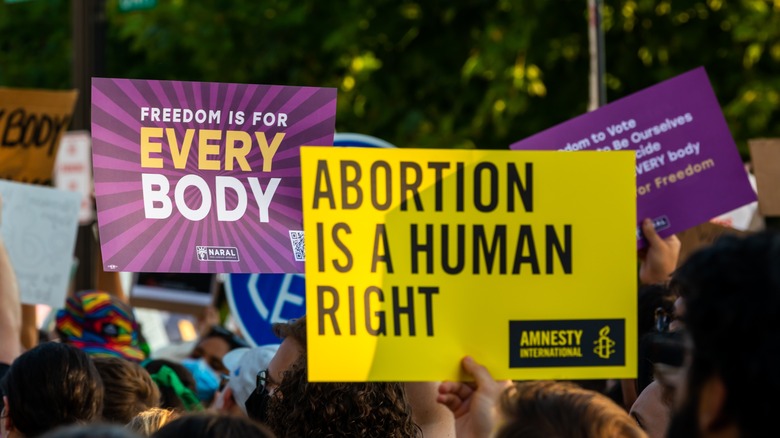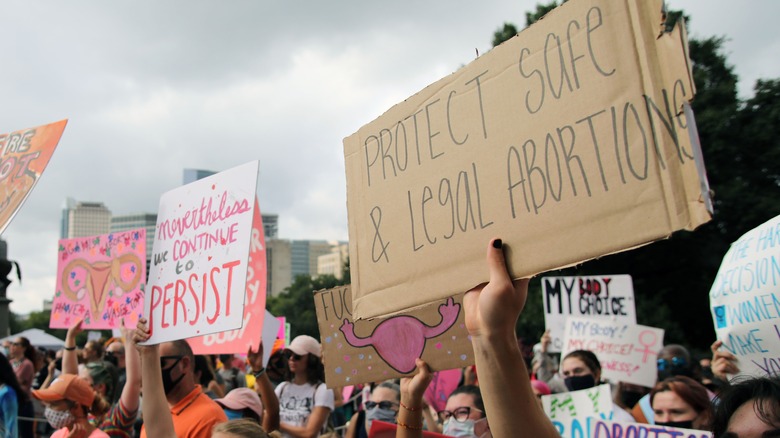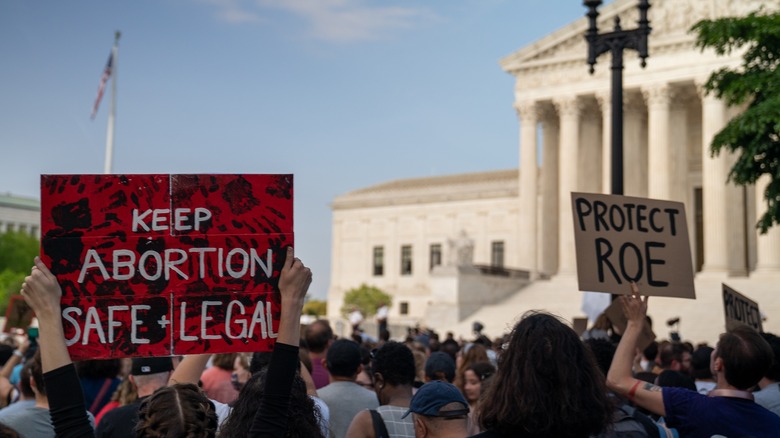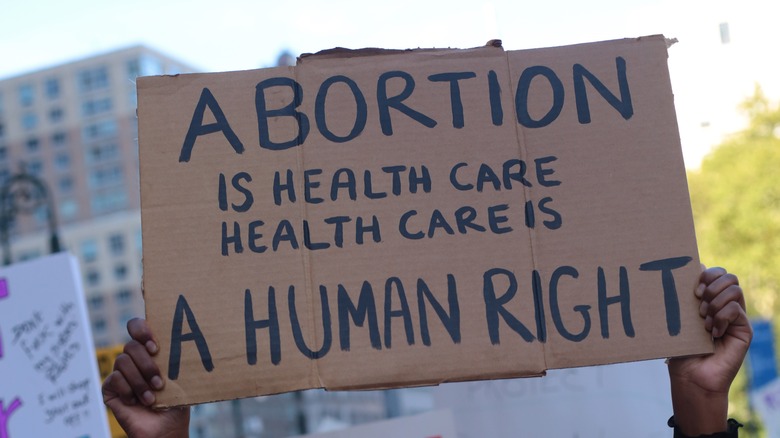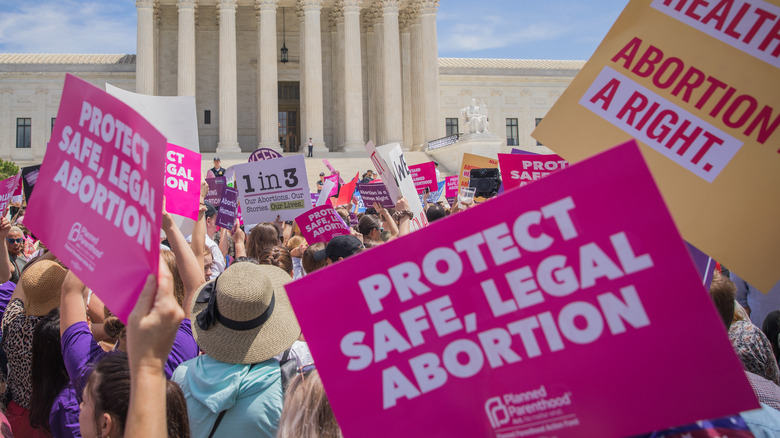Campaign Ads Have Become An Unlikely Platform For Women To Share Their Abortion Stories
One of the unsurprising side-effects of the Dobbs v. Jackson Health Organization decision has been that abortion has become a major focus of the 2022 midterm elections. They believe that losing the protections afforded in Roe v. Wade's decision hasn't only "reawakened" the Democrat's progressive base, according to The New York Times, but strategists believe Independents and even some Republicans may sway from voting down party lines in November.
"Rarely has an issue been handed on a silver platter to Democrats that is so clear-cut," said Anna Greenberg, a Democratic pollster, told the outlet, adding, "[Dobbs] took an election that was going to be mostly about inflation and immigration and made it also about abortion."
Political ads about abortion have been running since Politico leaked a draft opinion by the Supreme Court foreshadowing the Dobbs decision, according to a report by the Wesleyan Media Project. But now that abortion rights are on the ballot in many states, Democrats and Republicans have both been running political ads arguing to protect or rescind abortion rights in November.
To get their point across, both parties are willing to go to any length — including lying in television, radio, and internet ads. Unfortunately, research shows abortion is already a topic that has been saturated with misinformation. To get to the truth of the situation, Democrats have enlisted the help of people willing to share their stories.
How pro-abortion groups are campaigning for the 2022 midterm elections
To try and combat misinformation and persuade voters to protect abortion rights, pro-abortion ads range on a spectrum from using direct quotes and specific positions Republicans have taken on the subject to calling Republicans extremists, per The New York Times. One early ad in Pennsylvania attacks Doug Mastriano by not only using his own views against him but including personal experiences to drive the message home.
We've seen this countless times now: A hashtag starts trending and people jump in, sharing their experiences too. For many groups looking to get the vote out to help protect abortion rights, this was the perfect framework to build a political advertising campaign around (via New York Times).
"Democrats shouldn't be afraid to talk about abortion — and sharing personal abortion stories affirms why we need to protect this fundamental freedom," Gabby Richards, director of federal advocacy communications at Planned Parenthood Action Fund, told The 19th News.
In South Carolina, Joe Cunningham enlisted the help of Fran, who disclosures she was brutally raped and needed an abortion at a very young age. "I did what was best for an 88-pound 12-year-old with no other options," Fran says in Cunningham's newest campaign ad. She adds, "I am a survivor of rape. My body is not yours, and it is not the state's. It's mine. Yet our governor, Henry McMaster, wants to ban all abortions."
The political history of sharing personal abortion stories
After Politico leaked a draft opinion that foreshadowed the Dobbs v. Jackson Health Organization decision, people felt more compelled than ever to disclose the truth of their abortion experiences. As Vanity Fair explains, there's a strong history of using personal experience to compel politicians to protect the right to abortion.
In fact, on February 13, 1969, a group of protestors interrupted a meeting of New York State's Joint Legislative Committee on the Problems of Public Health, per The New Yorker. The committee was debating whether or not they should allow exceptions to an 86-year-old abortion ban, asking a panel of 15 "experts" — lawyers, doctors, politicians, and members of the clergy — to testify. Vanity Fair notes that the only woman on the panel was a "nun who viewed abortion as a mortal sin."
For The New Yorker, culture writer Ellen Willis explained that the protesters — herself included, per Vanity Fair — believed "women should not have to petition doctors (mostly male) to grant them as a privilege what is really a fundamental right, and that only the pregnant [person themselves] can know whether [they are] physically and emotionally prepared to bear a child."
Personal abortion stories are being used to battle misinformation
The same argument is being fought today, but in the weeks leading up to the midterm elections in November, the media has become the battleground. Doctors as well as politicians have been joining the fight as much as they're allowed. Some hospitals, however, aren't allowing their providers to speak to the media about how new abortion bans are effecting pregnant patients, leaving many doctors feeling "muzzled" following the abortion bans.
Elle spoke to five politicians who needed abortions for medical reasons. One of which was Senator Gary Peters, who explained how he and his then-wife were told by their doctor that the pregnancy was no longer viable after Peters' wife water broke at the end of her second trimester. Peters explained that because of Michigan's abortion laws at the time, and "because there was a faint fetal heartbeat, [his wife's doctor] had to get approval from the hospital board" before performing an abortion — a procedure necessary for saving her uterus. The hospital refused, forcing Peters and his wife to find a hospital who would help them.
Michigan is just one state where abortion is on the ballot this November. As the Michigan Advance reports, one of the major battles politicians face is with misinformation. California Congresswoman Jackie Speier took the battle against misinformation to the floor of the House. She explained to Elle that in 2011, she was moved to interrupt the proceedings when one of her colleges was talking about "sawing off limbs" during an abortion procedure — something that is patently false.
Research shows misinformation is responsible for abortion bans
Representative Jackie Speier's experience with having to disprove her colleague on the floor of the house is a dangerous example of the power of misinformation. According to an analysis by the National Partnership for Women and Families, 70% of the state-level abortion laws introduced in 2016 were based on lies like the one Speier heard back in 2011.
Unfortunately, abortion misinformation is just as ubiquitous today. Not only has research found that most easily-accessed abortion information is meant to "misinform and thwart abortion access," per Scientific American, but many of the claims against abortion are that it's unsafe.
Anti-abortion political ads — whether they're on television, on the radio, or mailed out to voters — contain damaging, dangerous misinformation. Vermont is just one state where voters will decide on the right to abortion in November and if that right will be protected in their constitution. Valley News reports that back in August, voters in Vermont received a pamphlet claiming Vermont wants to protect "late-term abortion of fully developed babies." VTDigger adds Bishop Christopher Coyne of Vermont's Catholic Church also claims the bill would "allow a child to be aborted right up to the moment of birth," which would mean abortion equates to "literally killing babies," per the Bishop.
However, a memo written by Brynn Hare — the legislative counsel working on Vermont's abortion bill — clarified the bill means a pregnant person can obtain an abortion without notifying or getting permission from parents, guardians, or a spouse first.
Lying in paid political ads is legal
Of course, using fake but still horrific scenarios like Bishop Christopher Coyne did in Vermont has been a key component of anti-abortion discourse for years. From doctoring pictures of what abortions really look like to disguising crisis pregnancy centers as abortion clinics, anti-abortion activists have proven they will do or say anything to win their argument.
A Washington Post report from 1992 warns of 30-second spots where it was implied they were showing a fetus after it had been aborted in the third trimester. The message they were sending, the Post explains, was that if something is too horrific to be looked at, it should be banned. However, the idea being peddled in Vermont — that abortions are being performed moments before birth — was refreshed in 2016 by then-presidential candidate Donald Trump during his third debate against Hillary Clinton, per Business Insider.
But as Tom Wheeler, former chair of the Federal Communications Commission under President Barack Obama, explained to NPR, the right to lie in political ads is — as Wheeler believes it should be — protected under the First Amendment. For Wheeler, the "First Amendment is an abiding and important, if not essential, concept in an American democracy."
So while there are laws around advertising, GBH News explains these are meant to protect consumers from poor products. Political ads, however, are technically just discourse — discourse that various courts have repeatedly upheld the right to lie during.
